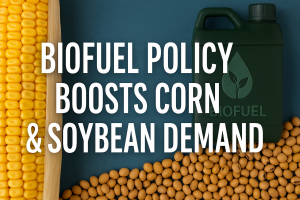Kansas City Fed Study Links Biofuel Policy to Farm Demand
The Kansas City Federal Reserve Bank released a new report showing how upcoming biofuel policy changes will determine future demand for U.S. corn and soybean production.
Exports, the study says, will not rise enough to absorb projected crop surpluses. Instead, policy will play the most critical role in stabilizing farm prices.
Biofuels and Corn Demand Growth
Over the past three decades, corn demand surged primarily because of ethanol. Much of that growth followed the 2007 Renewable Fuel Standard (RFS), which required gasoline and diesel refiners to blend biofuels into their products.
The RFS and related subsidies also boosted demand for soybean oil, a key input in biodiesel production. Exports helped absorb some corn and soybean supplies, but domestic biofuel mandates created the largest market shift.
What’s Changing in Biofuel Rules
The Federal Reserve Bank study stressed that proposed revisions to U.S. biofuel policy will shape demand moving forward.
“If approved, the 2026–27 quota for biomass-based diesel would increase by 50 percent from its 2024 levels, while also increasing quotas for renewable fuel (corn ethanol) and advanced biofuels,” researchers noted.
Key changes include:
-
Quota increases: Higher requirements for renewable fuels, including ethanol and advanced biofuels.
-
Domestic preference: Foreign inputs would count at half the rate of North American feedstock, increasing reliance on U.S. crops.
-
EPA projection: Biodiesel producers may need 250 million more gallons annually, equal to more than 5 million metric tons of crushed soybeans—about 4% of current U.S. production.
Impact on U.S. Farmers
For corn and soybean producers, the changes represent both risk and opportunity. Increased quotas would provide a steady domestic market, especially if exports remain flat.
The Environmental Protection Agency (EPA) estimates that policy adjustments will directly raise demand for U.S. soybeans and corn, helping to stabilize prices and offset volatility tied to global trade.
With the U.S. agriculture sector already adjusting to climate impacts and fluctuating export markets, the Fed study underscores how Washington’s energy policies remain a central driver of farm economics.
📌 Source: Kansas City Federal Reserve Bank-edited for clarity by Oklahoma Energy Today
📌 More Energy News


